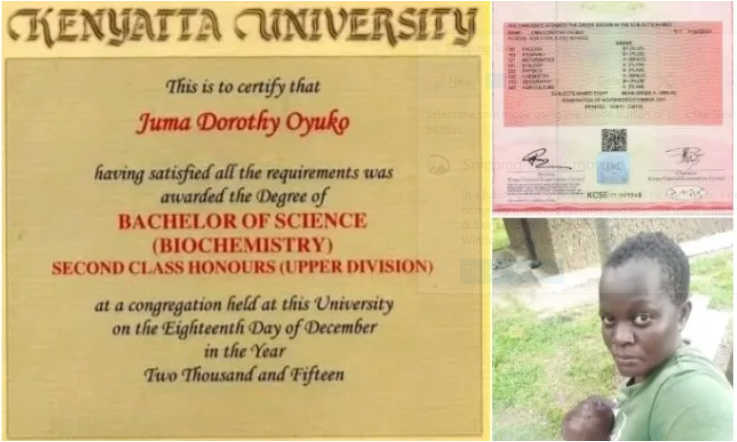Graduating with flying colors from a prestigious university is a dream come true for many students. However, for Dorothy Oyuko Juma, a Biochemistry graduate from Kenyatta University, her academic success has not translated into immediate employment opportunities.
Eight years after her graduation in 2015, Dorothy is still struggling to find a job, and her story sheds light on the challenges that highly qualified graduates often face in the job market.
Dorothy’s academic journey was filled with achievements. She excelled in primary and secondary school, earning an impressive A- in the Kenya Certificate of Secondary Education (KCSE) and securing a place at Kenyatta University.
With high hopes and aspirations, she pursued her Bachelor of Science degree in Biochemistry, a field she was passionate about. Her dedication and hard work paid off, and she graduated with flying colors.
However, Dorothy’s post-graduation experience has been anything but smooth. Despite her impressive qualifications and academic achievements, she has been unable to secure a job that matches her education and skills. She has been searching for employment for eight long years, and the frustration is palpable in her words.
“I really need a job to provide for my family and also make use of the education I got. It is so hard; I have tarmacked for eight years with no success,” Dorothy shared with the media.
Her desperation is evident as she reaches out to research institutes like the Kenya Medical Research Institute (KEMRI), food processing companies, and firms dealing with chemicals, seeking assistance in finding a job.
Many graduates around the world face similar challenges in the job market. Despite their qualifications and skills, they often encounter barriers in securing meaningful employment.
Factors such as limited job opportunities, lack of experience, and intense competition in the job market can make it difficult for graduates to find suitable employment.
Moreover, the gap between education and employment is a common issue. Many graduates find that their academic qualifications do not necessarily align with the requirements of the job market.
This can result in a mismatch between the skills possessed by graduates and the skills demanded by employers, making it challenging for them to secure employment in their chosen field.
The issue of unemployment among highly qualified graduates is not only a personal struggle for individuals like Dorothy but also a societal concern. It represents a loss of talent and potential that could contribute to the growth and development of the economy.
, the financial strain of prolonged unemployment can impact the livelihoods of graduates and their families, creating social and economic challenges.
Addressing the issue of unemployment among highly qualified graduates requires a multi-faceted approach. It involves creating more job opportunities, bridging the gap between education and employment, and providing support and resources for job seekers.
This includes initiatives such as internships, apprenticeships, and mentorship programs that can provide practical experience and enhance the employability of graduates.
Furthermore, collaboration between educational institutions and industries can help align the skills taught in academia with the skills demanded in the job market.
This can involve curriculum reviews, industry partnerships, and skills development programs that equip graduates with the right skills and knowledge for the workforce.

